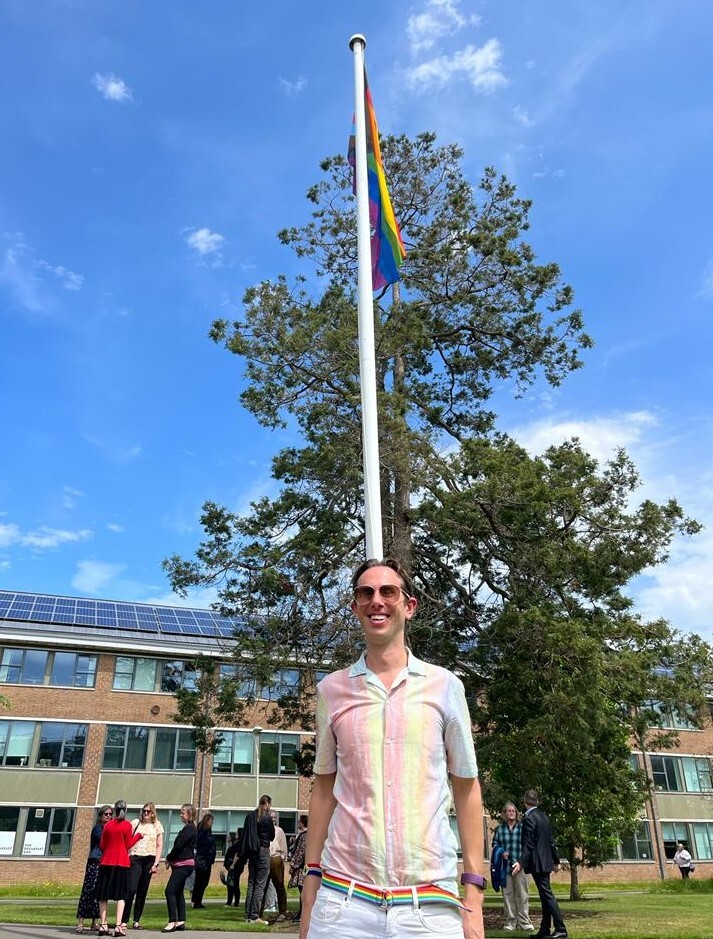17 May is the International Day Against Homophobia, Biphobia and Transphobia (IDAHOBiT). Every year UoR marks this occasion and in May 2022 we were able to do so in-person.
The main event took place on the Whiteknights campus on Tuesday 17 May at lunchtime. The event was open to all colleagues and students. The aims of IDAHOBIT day are to engage with staff and students about LGBT+ issues and inspire LGBT+ allyship amongst our staff and students. We flew the rainbow flag on our campus flag pole and had some speeches from both staff and student representatives.
Dr Ruvi Ziegler (he/him), Chair of the LGBT+ staff network
The official site for IDAHOBiT explains that the International Day Against Homophobia, Transphobia and Biphobia was created in 2004 to draw the attention to the violence and discrimination experienced by lesbian, gay, bisexual, transgender, intersex people and all other people with diverse sexual orientations, gender identities or expressions, and sex characteristics. May the 17th was chosen to commemorate the World Health Organization’s decision in 1990 to declassify homosexuality as a mental disorder.
What does Homophobia, Transphobia and Biphobia mean today?
While we have witnessed significant legal advances in LGBT+ equality in parts of the world, there remain many places where LGBT+ persons are not free to live, thrive, and be partnered to whomever they wish. LGBT+ persons’ experiences are shaped globally by criminal sanctions and oppression, social barriers, intolerance, and unwillingness to accept and recognise them for they are.
Of 194 countries surveyed by International Lesbian, Gay, Bisexual, Trans and Intersex association, over 2 billion people live in 70 countries where consensual same-sex sexual acts between adults are illegal. In 11 of those countries, it carries the death penalty.
On the other side of the recognition/protection scale, only 68 countries offer broad legal protection against discrimination based on sexual orientation. And, of those, only 29 enshrine marriage equality in their laws.
Some of those seeking refuge from persecution on grounds of sexual orientation come to our shores. As the recently enacted Nationality and Borders Act makes it harder for LGBT+ asylum-seekers to ‘prove’ who they are, and as the Memorandum of Understanding with Rwanda puts them at risk of being sent to harm’s way, I am proud that the university, jointly with Reading city of sanctuary and the Reading Refugee Support Group, offers a sanctuary scholarship scheme at all study levels designed to enable 12 students who are asylum-seekers or who have received a protection status in the UK to come to study here. I hope some of the recipients will be LGBT+.
BUT, lest we forget, our society is hardly in a position to rest on its laurels. Last year’s Yougov survey suggested that 26% of UK adults would be ashamed to have an LGBT+ child. Jack Daniels’ coming out this week as the first active male professional footballer to do so made major headlines. In a fully accepting and inclusive society, it would not.
Home Office figures show that hate crimes against people based on their sexual orientation have risen every year in England and Wales from 2016/17 to 2020/21. In 2016/17, there were 8,569 such crimes recorded by the police, rising to 17,135 in 2020/21. My husband and I have experienced homophobic verbal abuse twice during lockdown for daring to hold hands in Oxford. Like probably many others, we have not filed a complaint, so this scary figure is based on under-reporting.
Hate crimes against trans people have risen more than twofold, from 1,195 to 2,630 in the same period, no doubt fuelled by a toxic and often hostile public discourse.
Therefore, IDAHOBIT is fundamentally important wherever you are, as it is a day that gives the LGBT+ community and its allies the world over the opportunity to celebrate the social and political advancements in LGBT+ equality but also to reflect on the work that remains to be done to make our communities truly inclusive.
It is, also a great opportunity for employers like ours to help raise awareness about tackling LGBT+ discrimination and show support by being visible allies. At Reading, some members of our community have recently questioned whether this campus is a safe and welcoming space for them: this cannot stand. Our continuing mission must be to make this university as inclusive a space as it can be.
As Chair of the LGBT plus staff network, I would like to invite all our Staff and PGR students who identify as Lesbian, Gay, Bi, Trans, asexual, intersex, non-binary or any other sexual and gender identities– as well as LGBT+ people with multiple identities, and indeed everyone else who sees themselves as an ally – to join us. We are stronger together.
Thank you to all our speakers and to all our staff and students who came along!
Further Resources:
IDAHOBIT: https://may17.org/
Get Involved with D&I work: https://www.reading.ac.uk/diversity/getting-involved
Join the LGBT+ Staff Network as a member or ally: https://www.reading.ac.uk/diversity/getting-involved/networks#LGBTPlusNetwork
RUSU LGBQ+ Officer: https://www.rusu.co.uk/representation/student-reps/part-time-officers/lgbq-plus-officer/
RUSU Trans Student Officer: https://www.rusu.co.uk/representation/student-reps/part-time-officers/trans-students-officer/
RUSU LGBT+ Student Society: https://www.rusu.co.uk/organisation/11536/
If you have any queries, please get in touch with diversity@reading.ac.uk






